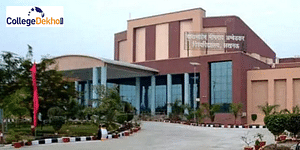MSc in Microbiology
MSc Microbiology Course Overview
MSc Microbiology course is a two-year master's degree programme. An in-depth understanding of microorganisms, such as bacteria, viruses, and algae, as well as their roles in fermentation and waste management, are taught in this advanced course. The MSc in Microbiology course syllabus covers the basic understanding of the roles played by bacteria, fungi, viruses, algae, and other microbes. Among the many topics covered in the MSc Microbiology syllabus and subjects are microbial ecology, virology, mycology, genetics, immunology, and microbial physiology.
The MSc Microbiology course requires applicants to have a BSc degree with at least 50% aggregate marks from an accredited university for them to be eligible. Some popular universities that offer this course are Jawaharlal Nehru University, Calcutta University, Alagappa University, Delhi University, etc. The list of common entrance exams for this course includes CUET PG, IPU CET, BITSAT, and others. The average MSc in Microbiology course fee varies between INR 20,000 to 5,00,000. Graduates of this course can pursue careers as Quality Control Executives, Associate Researchers, Academic Lecturers, Microbiological Auditors, Lab Technicians, Clinical Executives, etc. with an average salary ranging from INR 4-10 LPA. This page discusses the semester-wise MSc Microbiology syllabus and subjects, course structure, best reference books, list of electives, popular specialisations, and more.
MSc in Microbiology Latest Update
The National Testing Agency (NTA) will officially release the CUET PG 2024 admit card on March 07, 2024, which students can download after logging on to the official website using their credentials.
Table of Contents
- MSc Microbiology Course Overview
- MSc in Microbiology Latest Update
- MSc Microbiology Course Highlights
- Why Choose an MSc Microbiology Degree?
- What is an Online MSc Microbiology Degree?
- What is the Difference Between MSc Microbiology and MSc Biotechnology?
- Types of MSc Microbiology Courses
- MSc Microbiology Eligibility Criteria
- MSc Microbiology Entrance Exams
- MSc Microbiology Admission Process in India
- MSc Microbiology Fees in India
- MSc Microbiology Syllabus/ Subjects
- Top Private MSc Microbiology Colleges in India
- Top Government MSc Microbiology Colleges in India
- Top MSc Microbiology Colleges Offering Admission in India
- Career Options After MSc Microbiology
- Courses After MSc Microbiology Degree
- FAQs about MSc Microbiology
MSc Microbiology Course Highlights
Candidates can take a look at the table below to acquaint themselves with some major highlights of the MSc Microbiology course:
| Particular | Detail |
|---|---|
| Name | MSc Microbiology Course |
| Full Form | Master of Science in Microbiology |
| Duration | 2 years |
| Level | Postgraduate |
| Fee | INR 20,000 to 5,00,000 |
| Eligibility Criteria | BSc degree with at least 50% from an accredited university |
| Admission Process | Merit-Based + Entrance Based |
| Entrance Exam | IPU CET, BITSAT, CUET PG, etc. |
| Top Colleges | Alagappa University, Aligarh Muslim University, Bharathiar University, Calcutta University, etc. |
| Job Profiles | Microbiologist, Clinical Research Associate, Research Analyst, Project Assistant, and Nutritionist, among others. |
| Salary | INR 4-10 LPA |
| Top recruiters | Cipla, Ranbaxy, Sun Pharma, Mascot International, Siron Technology, Pvt. Ltd., Lakshmi Life Sciences Ltd, Panacea Biotec Limited, Serum Institute of India, etc. |
Why Choose an MSc Microbiology Degree?
MSc Microbiology has been one of the popular science disciplines pursued by aspirants in India and across the globe and for good reasons. From incredible academic prospects to career paths that are rewarding, both professionally and financially, pursuing a two-year postgraduate course could prove to be the best choice for you. Outlined in the infographic below are some reasons why you should study MSc Microbiology courses:
Incredible Career Prospects
Among the scientific disciplines, Microbiology may often be considered one of the fields with the highest career prospects. From high-paying jobs to job roles across various industries and sectors, MSc Microbiology trains and qualifies individuals for a range of lucrative roles, especially in the pharmaceutical industry.
Rewarding Discipline
The impact of microbiologists, specifically on the health and well-being of society, often leads to highly rewarding careers. Graduates of the field not only enjoy financial benefits but, in many cases, moral benefits as well. Microbiologists also see incredible career growth opportunities, from research and development to heading entire teams in their respective fields.
High Demand
With a more health-conscious approach taken up, not only by pharmaceutical giants but also food and beverage conglomerates, skin care industries and many other multi-national organisations around the world, Microbiologists provide the much-needed seal of authenticity that attracts more buyers. Thus, the scope of work for MSc Microbiology is continuously growing in demand and variety.
Academic Prospects
The scope of MSc Microbiology also includes the academic prospects, wherein, there are immense opportunities for microbiologists to conduct research and development. The programme directs graduates to the right path towards the scope of improvement that could be made to the discipline, allowing for better technology and methodologies to be adopted.
What is an Online MSc Microbiology Degree?
Through online courses and other distance learning resources, candidates can obtain a postgraduate degree in microbiology with an MSc in Microbiology. Individuals who wish to work in microbiology or associated sectors but find it difficult to attend typical on-campus classes because of work or other obligations can take the online MSc Microbiology course. Topics including food microbiology, virology, immunology, microbial genetics, environmental microbiology, medical microbiology, and biotechnology are often included in the program's curriculum. The traits and behaviours of microbes, their place in many habitats and ecosystems, and their effects on human health and illness will all be covered in the curriculum.
Prospective aspirants must have a bachelor's degree in an associated field — such as chemistry, biology, or biochemistry — to be eligible for the programme. The degree programme takes two years to complete, though this varies based on a candidate's preferred college or university. In India, colleges that provide online MSc Microbiology courses include Annamalai University, Karnataka State Open University (KSOU), and more.
What is the Difference Between MSc Microbiology and MSc Biotechnology?
The MSc Microbiology course is often confused with MSc Biotechnology by the students. The students must know the basic difference between these two courses. Though there are certain basic similarities between these two courses, there are some major differences as well. The differences between the MSc Microbiology course and MSc Biotechnology concerning certain criteria are mentioned below.
| Criteria | MSc in Microbiology | MSc in Biotechnology |
|---|---|---|
| Overview | The MSc Microbiology course deals with living systems and their impact on the environment in the fields of biology and chemistry | MSc Biotechnology is a specialised course that enhances the skills and knowledge in subjects like cell immunology, cell biology, and similar others. It also studies the impact of technology on life sciences. |
| Focus | Focuses on studying and understanding everything related to microorganisms, including the impact of microorganisms, their uses in human society and more. | The course focuses on developing new processes and technologies using knowledge gained through biology and technology, for the benefit of various sectors like healthcare, agriculture, food and more. |
| Course Duration | 2 years | 2 years |
| Admission Process | Entrance Exam | Entrance Exam |
| Eligibility Criteria | Graduation in Microbiology or similar subjects | Graduation in Biological Sciences, B Pharm, BAMS, MBBS, BPT, etc. from a recognised board or university |
| Course Fee | INR 20,000 to 5,00,000 | Up to INR 2 LPA |
| Average Salary | INR 4-10 LPA | INR 8-10 LPA |
Types of MSc Microbiology Courses
Much like many other courses offered in India, students will be able to choose between different types of MSc Microbiology courses, based on the teaching methodologies adopted. Understanding the needs of the applicants, several universities, including, reputable colleges and universities offer different courses under different teaching methodologies. Some of these different types of MSc Microbiology courses available in India include:
- Full-time MSc Microbiology Courses: The most common among all the different types of courses, students will be required to physically attend classroom lectures, and laboratory sessions and spend entire days studying different topics under the degree programme.
- Part-time MSc Microbiology Courses: Such courses allow students to take up part-time jobs or complete other important tasks while also focusing on their education. In such courses, students are required to attend some classes on campus, while, others can be taken up online.
- Distance Learning MSc Microbiology Courses: Even as a research-oriented programme, several universities and institutes offer MSc in Microbiology in distance learning modes. Another alternative to part-time and full-time courses, students can attend lectures and lab sessions completely only, without missing out on the important details regarding the course.
There will be significant differences between the various types of MSc Microbiology, ranging from student experiences to even career prospects. Therefore, candidates are advised to consider their options carefully before submitting their application forms.
MSc Microbiology Eligibility Criteria
The MSc Microbiology eligibility requirements that candidates must adhere to are as follows:
- Class 10th and 12th marksheets with a minimum percentage of 50% aggregate marks or higher are required.
- A microbiology bachelor's degree from an accredited university or an equivalent with at least 55% aggregate marks or higher.
- Students must pass the entrance exam to be considered for the cutoff or merit list at institutions that hold entrance exams.
- Some universities may require students to also submit SOPs and LORs along with their application form, outlining their motivation and objectives behind pursuing the course at a specific university.
Required Skill Set for MSc Microbiology
For the MSc Microbiology course and learning to be effective, the students must possess the necessary skills. For the MSc Microbiology course, a significant amount of scholarly reading is needed. In addition to having good reading habits, students need to have a wide range of skills that will help them in their MSc Microbiology course. Having the skills listed below can also help them develop their personalities and get a position that's right for them in the field. Here are the required skills for the MSc Microbiology course.
| Analytical Skills | IT Skills |
|---|---|
| Research Skills | Time Management Skills |
| Communication Skills | Adjustment skills |
| Leadership Skills | Team building skills |
| Listening Skills | Patience |
| Attention to Details | Hard work |
| Interpersonal Skills | Decisiveness |
| Numerical Skills | Independent |
MSc Microbiology Entrance Exams
The MSc in Microbiology entrance exams are required for admission to various colleges and universities that offer this specialisation. Students can get information about the entrance examinations offered by various universities in the following table.
| Entrance Exam | Description |
|---|---|
| CUET PG | The Common University Entrance Test (CUET PG - 2024) has been implemented to facilitate admission to a range of postgraduate programmes at Central and State Universities, as well as participating Deemed/Private Universities. |
| IPU CET | Indraprastha University also enrols students in postgraduate courses such as two-year postgraduate microbiology courses through the IPU CET, which is IP University's common entrance exam. |
| BITSAT Exam | Admissions to renowned BITS institutes across the country will be based on the scores obtained by applicants in the nationally organised BITSATs held each year. |
MSc Microbiology Admission Process in India
In India, admission to the MSc in Microbiology course is typically based on entrance exam results, however, each university reserves the right to determine the admission process and eligibility criteria. However, some MSc Microbiology admission processes commonly used by universities and colleges are listed in the infographic below and explained further.
- Entrance-Based Admission: Universities and colleges usually require students to take entrance exams such as the BITSAT, IPU CET, and CUET PG, among others. Some universities and colleges may even hold their entrance exams to select the best candidates for the programme.
- Merit-Based Admission: Many universities may enrol students solely based on their academic merit. However, such universities may use additional selection processes, such as personal interviews, to enrol students. Furthermore, such institutions will maintain high academic standards to select the best candidates.
The steps for MSc in Microbiology admission 2024 are as follows:
Step 1: Firstly, make sure you are eligible for each entrance and register for the necessary exams.
Step 2: Pass the relevant college or university exam to get accepted into the MSc Microbiology course.
Step 3: The college releases a list of students who have been shortlisted and announces the results once the admissions process has concluded successfully.
Step 4: Candidates who have been shortlisted must next go through the college-specific admissions process.
Step 5: The final step of admissions is assigning seats to the students. Next, to be considered for the course, candidates must deposit the required amount and register with the appropriate college for that academic year.
MSc Microbiology Fees in India
MSc in Microbiology is offered by numerous educational institutions in India. The MSc Microbiology course fees in India vary depending upon whether the college is government or private. Private colleges are likely to charge higher fees than government colleges as it depends on the facilities provided, research opportunities, recruiting companies that visit the college campus, and other related factors. Usually, the average annual MSc Microbiology fees range between INR 6,000 and INR 2,50,000. The following table provides an overview of the same:
Institute Type | Average Annual Tuition Fee (Approx. in INR) |
|---|---|
Private | 30,000 to 2,50,000 |
Government-aided | 6,000 to 50,000 |
MSc Microbiology Syllabus/ Subjects
There are numerous MSc Microbiology subjects included in the two years of the course of study, ranging from Biostatistics and Computer Applications, Recent Trends in Virology, to Microbial Genetics, Pharmaceutical Microbiology, and more. The MSc Microbiology Syllabus includes a variety of laboratory and research projects throughout the course duration, in addition to imparting theoretical knowledge. The following is a brief overview of the MSc Microbiology syllabus/ subjects:
- Recombinant DNA Technology
- Recent Trends in Virology
- Proteomics and Genomics
- Principles of Biochemistry
- Molecular Microbiology
- Microbial Physiology and Metabolism
- Immunology
- Host-microbe interactions
- Fermentation Technology
- Environmental Microbial Technology
- Biomolecular Structures & Their Interactions
- Bioenergetics and Molecular Enzymology
Top Private MSc Microbiology Colleges in India
The following is a list of the top MSc Microbiology private colleges in India.
| College Name | Total Fee (in INR) |
|---|---|
| Amity University, Noida | 3 lakhs |
| Bharath Institute of Higher Education and Research (BIHER) | 2 lakhs |
| Mahatma Gandhi Medical College and Research Institute, Sri Balaji Vidyapeeth | 5 lakhs |
| Srinivasa Ramanujan Center, Shanmugha Arts, Science, Technology and Research Academy | 80,000 |
| Sri Ramachandra Institute of Higher Education and Research | 4 lakhs |
| UPES Dehradun | 5 lakhs |
| VIT Vellore | 2 lakhs |
| Chandigarh University | 2 lakhs |
| JSS Academy of Higher Education and Research | 87,000 |
| Lovely Professional University | 3 lakhs |
Note: The aforementioned fee is subject to change.
Top Government MSc Microbiology Colleges in India
The following is a list of the top MSc Microbiology government colleges in India.
| College Name | Total Fee (in INR) |
|---|---|
| Jamia Millia Islamia | 1,00,000 |
| Panjab University | 28,000 to 2,00,000 |
| Bharathiar University, Coimbatore | 21,000 |
| Calcutta University | 20,000 |
| University of Mysore | 20,000 |
| University of Madras | 29,000 to 45,000 |
| University of Hyderabad | 24,000 |
| MGU Kerala - Mahatma Gandhi University | 20,000 |
| Alagappa University | 20,000 |
Note: The aforementioned fee is subject to change.
Top MSc Microbiology Colleges Offering Admission in India
The following is a list of the top MSc Microbiology colleges in India.
| College Name | Average Annual Fee (Approx in INR) |
|---|---|
| St Xavier’s College | 1,02,000 |
| Fergusson College | 63,000 |
| St Joseph’s College | 1,05,000 |
| Amity University | 80,000 |
| Presidency College | 92,000 |
| St Francis College For Women | 35,000 |
| Kristu Jayanti College | 87,000 |
| Ramnarain Ruia Autonomous College | 35,000 |
| Chandigarh University | 1,06,000 |
| The Oxford College of Science | 50,000 |
Note: The aforementioned fee is subject to change.
Career Options After MSc Microbiology
Numerous industries provide a wide range of MSc Microbiology job opportunities to recent graduates. Microbiologists are needed in a variety of fields, including chemical technology, nanotechnology, pharmacology, and the water business. The MSc in Microbiology course graduates have a decent starting pay scale that increases gradually with experience.
Job Options After MSc Microbiology
Some of the most popular MSc Microbiology jobs are listed below, along with their descriptions and average salary offered.
| Job Profile | Job description | Average Salary (in INR) |
|---|---|---|
| Microbiologist | They study microorganisms like fungi, viruses, bacteria, and algae. Bacterial and viral scientists are among the positions they hold. | 8 LPA |
| Nutritionist | These professionals' main goal is to provide diets to individuals or institutions. They ensure that the individual's meal meets his or her health requirements. | 7 LPA |
| Project Assistant | The goal is to assist the project manager and guide the team through the service delivery process. They review, process, and manage data and documents for microbiology projects. | 5 LPA |
| Research Analyst | Research analysts collect and organise data collected during microbiology and pharmaceutical studies and surveys. | 8 LPA |
| Clinical Research Associate | Assisting with clinical research and offering advanced advice on supply management, test ordering, and results organisation. | 9 LPA |
MSc Microbiology Salary
MSc Microbiology graduates' salaries vary depending on a variety of factors. The college from which an individual graduated is evaluated based on its rating and the quality of education provided. Other factors include people's skills, knowledge, and interests. The college's geographical location and size have an impact on the salary. The expected MSc Microbiology salary details are provided below.
| Level of Experience | Average Annual Salary (Approx. in INR) |
|---|---|
| 1-4 years | 4-5 LPA |
| 5-9 years | 6-7 LPA |
| 10-19 years | 7-10 LPA |
MSc Microbiology Recruiters
MSc Microbiology job opportunities abound in a variety of industries. Microbiologists are needed in a variety of fields, including pharmacy, water treatment, chemical technology, and nanotechnology.
Some of the top recruiters in the MSc Microbiology field include:
- Mascot International
- Siron Technology Pvt. Ltd.
- Lakshmi Life Sciences Ltd
- Panacea Biotec Limited
- Serum Institute of India
- GlaxoSmithKline Pharmaceuticals Limited
Courses After MSc Microbiology Degree
Students in the MSc Microbiology course have a lot of educational options to choose from. The opportunities for students who complete an MSc in Microbiology are greater because they can pursue a variety of career paths or continue their education and pursue the following.
- PG Diploma in Microbiology: A Post Graduate Diploma in Microbiology is a diploma-level course that studies microorganisms and their effects on humans.
- PhD in Microbiology: In addition, students have the option of going for a three-year doctorate, during which they can conduct research on microorganisms. Microscopic analysis, unicellular organisms, cell cluster organisms, etc. will all be included in the research. A comprehensive thesis report must be turned in by the students to be awarded a PhD.
FAQs about MSc Microbiology
What are the prominent entrance exams for taking admission to MSc Microbiology Course?
Many popular universities and colleges that enrol a large number of students in a variety of their postgraduate courses conduct entrance tests for admission purposes. Some of the popular entrance tests include DUET, BHU PET, IPU CET, JNUEE, BITSAT, OUCET and many more. Some universities may even enrol students based purely on their academic merit, however, they may also conduct personal interviews to shortlist the best candidates.
What are the types of MSc Microbiology courses I can study?
There are different types of MSc Microbiology courses you can study in India such as full-time, part-time and distance learning courses. While full-time courses are the most popular choice among aspirants, many students also choose to study part-time, specifically distance learning courses. In addition to this, candidates may also study sub-divisions of Microbiology, like virology, bacteriology, immunology, etc.
Can I study MSc Microbiology abroad?
Yes, you can study MSc Microbiology abroad, provided you have the necessary qualifications to study at the respective university abroad. Among the requirements, students must have a bachelor’s degree in the respective fields, an English language proficiency score, and GRE test score and any other additional requirement that may be required by individual universities.
How can I study MSc Microbiology in India?
To study Microbiology in India, students must first possess a valid Bachelor’s degree, preferably a BSc in Microbiology or related courses. In addition to this, applicants will most likely be required to attempt and clear an entrance test either conducted by the individual institution or the state. Each university may add individual admission requirements to shortlist the best candidates.
Is MSc Biotechnology better than MSc Microbiology?
Determining the better course between biotechnology and microbiology courses will be subjective to individual candidates. Both MSc biotechnology and MSc microbiology courses offer similar career prospects, with graduates being qualified for a range of job profiles across different industries and sectors. However, MSc Biotechnology deals with a combination of biology and technology, while, microbiology deals with the study of microorganisms.
What skills do I need for MSc Microbiology?
If you are planning to study MSc Microbiology, there are numerous skills that you should either possess or instil during the course. Some of these skills include Analytical Skills, IT Skills, Research Skills, Time Management Skills, Communication Skills, Leadership Skills, Team building skills, Listening Skills, Patience, Attention to Detail, Hard work, Interpersonal Skills, Decisiveness, Numerical Skills and much more.
What is the highest paying role after MSc Microbiology?
Most companies offering high-paying roles to MSc Microbiology graduates in India are often managerial roles with the highest roles reported to be around INR 45 LPA. However, these are roles requiring a large amount of experience, often more than 10 years. However, graduates with 1-2 years can also find jobs earning around INR 20 LPA.
Is being a microbiologist stressful?
Yes, being a microbiologist can be a stressful job, however, this is extremely subjective to the company’s work environment and workload. Regardless, there is a level of precision, responsibility and accountability required by microbiologists in their line of work, as the work is often quantified using the data collected and compiled by the individuals with respect to their roles.
Can I become a doctor with MSc Microbiology?
To become a doctor or have the prefix added to your name, you must either complete a medical course or a PhD degree. Therefore, if you pursue PhD in Microbiology after MSc Microbiology, you will be able to add the prefix ‘Dr’ to your name. However, as a microbiologist, you can work in a hospital environment, running tests and evaluating different samples.
Are NEET scores needed for MSc Microbiology?
No, applicants do not need to attempt or rank in NEET to enrol in an MSc Microbiology course in India. However, there are a number of entrance exams for the course in India, most of which are organised and conducted by the respective institutions themselves. Therefore, candidates are advised to check the admission requirements before applying to any institution.
Is Microbiology in demand?
Yes, Microbiology is one of the more popular science courses opted by graduates, not only in India, but around the world as well. The career opportunities that are made available to graduates of the course are highly lucrative and varied, in terms of the job roles available and the industries they can work in.
What is the scope of the candidates who pursue MSc in Microbiology?
The scope of MSc Microbiology graduates is immense as they will be qualified for a range of job roles across a number of industries and sectors. Among such sectors include healthcare, food production and processing and pharmaceutical sectors, among many others. Microbiologists will find jobs wherever companies are creating products for human consumption or usage.
What is MSc Microbiology?
MSc Microbiology courses are two-year postgraduate courses where individuals research and study the biological processes of various microorganisms like viruses, bacteria, fungi and algae. Such knowledge and understanding of the “micro-universe” is extremely important to several sectors like food production and processing sectors, healthcare and pharmaceutical sectors and even sectors like beauty and skincare, agriculture and much more.
Do you think MSc Microbiology is a difficult subject to study?
Yes, MSc Microbiology is a difficult subject to study for most students since it covers some highly complex subjects and topics that require a good understanding of the different scientific disciplines. However, with hard work and dedicated studying, MSc Microbiology can be an easy subject to study and build a career in. In fact, Microbiology requires students to be curious and eager to learn, as the entire subject is research-oriented.
Who are top recruiters that hire candidates after pursuing an MSc Microbiology course?
From Indian-origin companies to foreign companies, Mc Microbiology graduates are in high demand across different sectors and industries. Some of the top recruiters for MSc Microbiology include Panacea Biotec Limited, Serum Institute of India, GlaxoSmithKline Pharmaceutical Limited, Mascot International, Siron Technology Pvt. Ltd., Lakshmi Life Sciences Ltd., and many more. Students will find work in the healthcare, food and pharmaceutical sectors in India.
What are the job roles after completing the MSc Microbiology course?
After graduating from the course, graduates will qualify for a range of jobs after MSc Microbiology courses in India. Some of the popular job roles that graduates can pursue after the course include Microbiologist, Virologist, Bacteriologist, Microbiology Lab Technician, Research Associate, Hygienist, Professor, etc. Students will be able to find jobs in hospitals, food processing and production industries, clinics, and other major organisations across the country.
What subjects are covered under MSc Microbiology in India?
Universities offering an MSc Microbiology course in India will cover a range of subjects and topics across the field of biology and allied sciences. Some of the topics include Molecular Biology, Microbial Diversity, Enzymology, Biostatistics, Virology, Bacteriology, Mycology and Phycology, DNA Technology and much more. Universities will also cover a range of elective subjects which will be unique to each institution in India.
What is the average MSc Microbiology fee?
The average Msc Microbiology course fee may range from INR 50,000 - 2.5 LPA. However, this course fee will be variable across different universities and institutions offering the course. Many factors, including the type of institution offering the course, the popularity of the course at a particular institute and much more affect the final tuition costs.
What is the duration of the MSc Microbiology course?
The course duration for MSc Microbiology courses in India is 2 years and covers a range of core and elective subjects giving in-depth training in the field of microbiology. MSc Microbiology is one of the more popular courses opted by students as a result of the incredibly-lucrative career options available after graduates across a range of industries and sectors like pharmaceuticals, food science, etc.
Is MSc Microbiology a good career?
Yes, MSc Microbiology is a good career option for any candidate wishing to build a career in science. From incredible academic paths to career opportunities, the course moulds students for a lucrative future. Graduates can find jobs in public and private sectors, earning anywhere from INR 4-10 LPA, depending on their job roles and experience, among other factors.
Can I do MSc Microbiology after graduation?
Of course, you can opt for a MSc Microbiology course after completing your graduation.
What is MSc Microbiology qualification?
Being a master’s degree, applicants interested in studying MSc Microbiology should have a valid bachelor’s degree in the relevant field. Moreover, applicants must have completed their bachelor's in either BSc Microbiology or any other related subjects in order to be eligible for the course. Some universities may even require additional test scores to evaluate the candidature of an applicant.
What is the full form of MSc Microbiology?
The full form for MSc Microbiology is Masters of Science in Microbiology, which is a two-year postgraduate course offered in India. Students interested in exploring the world of microorganisms and devising a way to use them for the benefit of society must look into pursuing a career in Microbiology. This field of study is one of the more lucrative science fields where both academia and professional pathways are rewarding.
Popular Courses
Related Questions
- Courses
- MSc in Microbiology


















